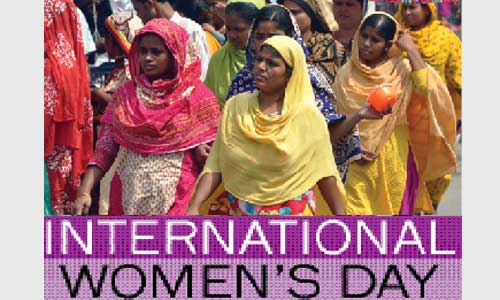Few women in JS, parties’ policy-making
Though women constitute 50 per cent of the country’s population their representation in Parliament and leadership positions of political parties does not reflect it.
In the 350-seat Parliament only 69 MPs are women and 50 of them from the reserved seats are not directly elected.
Political observers find the poor representation of women in politics hardly justifiable in Bangladesh led by women prime ministers since 1991.
The leader of the opposition also has been women since 1991.
Now the speaker is also a woman.
In the 73-memer central committee of ruling Awami League, only 10 are women leaders. In other words, women leaders get 13.69 per cent of positions in the AL central committee though the party is led by prime minister Sheikh Hasina.
The other big party, BNP offers 47 positions to women leaders in its 371-member central executive committee. It means that the former ruling party led by former prime minister Khaleda Zia offers 12.60 per cent of the positions in its central committee to women leaders.
The registered political parties are pledge bound to amend their constitutions to increase women’s representation to 33 per cent by 2020.
Women’s under representation in the policy making bodies of the political parties raises doubts about their commitments to fulfill the pledge within the deadline due to end in four years.
The parties wasted eight years doing virtually nothing to reach the goal set in 2008.
Jatiyo Party, Communist Party of Bangladesh, Socialist Party of Bangladesh.
Bangladesh Mahila Parishad president Ayesha Khanom blamed the mindset of the patriarchal society for denying women their due share in the leadership positions of the political parties though they make up a half of the country’s population.
She decried the social reservations that deny women their due seats in
policy making positions of political parties.
She said even competent and educated women face huge obstacles in reaching positions they deserve.
Ayesha said that the use of money and muscle in politics completely sidelined even competent women leaders.
For fewer participation of women in politics, state minister for women and children affairs Meher Afroze Chumki blamed the belated start of women empowerment in Bangladesh.
Besides, she said, traditionally men were reluctant to leave leadership to women.
A big reason for women lagging behind in politics in Bangladesh, she said, was that most families discourage them from taking part in politics.
Women occupy 15 seats in the 299-memer central committee of Jatiya Party of HM Ershad. In other words JP offered barely five per cent of the positions in its central committee to women.
AL presidium member Kazi Zafarullah said women leadership could not be created overnight but their representation in AL was increasing.
BNP is trying to increase the number of women’s representation in its central committee, said the party’s standing committee member Nazrul Islam Khan.
The Communist Party of Bangladesh gave seven seats to women leaders in its 44-member central committee while Socialist Party of Bangladesh gave no seats to women leaders in its four- member central committee.
Newly floated Ganasanghati Andolan gave seven seats to women leaders in its 35- member central committee.
News Courtesy: www.newagebd.com











